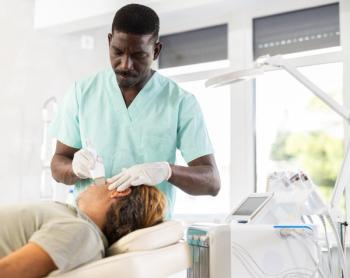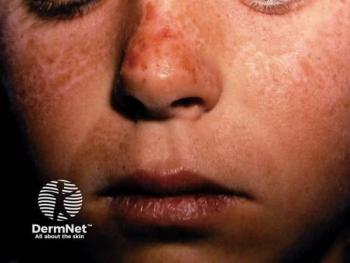Valisure's David Light Unpacks Benzene Findings, Stability Testing, and Discourse
Following the announcement of Valisure's findings related to benzene and benzoyl peroxide acne products, Dermatology Times spoke with David Light, co-founder and president of the laboratory behind the report, to discuss the findings, the role of stability testing requirements, and quelling fear-filled online discourse.
They found that some products contained up to 12 times the
The initial stability study tested 5 products at temperatures of 37°C, 50°C and 70°C. Afterwards, investigators conducted incubation testing with 66 BPO products, including creams, lotions, gels, and washes, commonly available over the counter or through prescription, at 50°C and 70°C for 18 days each per respective temperature.2
Specifically, Proactiv's 2.5% BPO cream manufactured by Taro Pharmaceuticals contained 1761 parts per million of benzene, while Target's Up & Up 2.5% BPO cream had 1598 parts per million. Estee Lauder's Clinique 2.5% BPO cream had 401 parts per million, Clearasil 10% BPO cream had 308 parts per million, and Walgreens 10% BPO cream had 114 parts per million, among those with the highest levels detected. Additionally,
The discovery has since raised concerns about the safety and regulation of acne products containing BPO, urging for further investigation. Consumers are wondering whether to discard or discontinue use of their BPO products, and similarly, dermatologists are unclear as to how to present this new information to their patients.
David Light, a co-founder and the president of
Breaking Down the Findings
Most shocking to researchers was the instability of BPO-containing products, particularly when exposed to elevated temperatures, which yielded levels of benzene far exceeding acceptable limits in a short timeframe.
Light drew parallels to previous pharmaceutical recalls, such as the
"The results there were showing that at 70 degrees Celsius, 158 degrees Fahrenheit, after 2 weeks of testing, they were forming about 1 time the regulatory limits of NDMA," Light said. "We're seeing up to 800 times in 2 weeks at a lower temperature of 50 degrees Celsius: a lower stability, temperature. It really is very shocking to see those kinds of numbers, and we hope that it's taken seriously by the manufacturing community and the regulators."
Referencing Figure 4 of the
"Of those 66 benzoyl peroxide products that we tested, 10 of those products already had over 10 parts per million of benzene, and 19 products already had over 2 parts per million, which means that many of these products already had unacceptably high benzene levels when Valisure first purchased them," Light said.
It is important to note that the benzene findings in these products containing BPO differs significantly from previous news reports stemming from
"The benzene was a raw material contaminant, and the amount of benzene on the shelf would not change," Light said. "The important point about the day 0 benzene levels in the BPO products is that they don't stay the same; the level of benzene can increase, because the benzoyl peroxide itself is unstable and makes more benzene over time, especially with any exposure to elevated temperatures. Even if a product is clean when purchased, it can form high levels of benzene over time even sitting in a medicine cabinet."
Unpacking Fact vs Fiction
Regarding the notion that breathing in polluted urban air has greater negative effects on the public than benzene in personal care products, Light said, "That is very much fiction."
"The benzene that's in the air is something that is very heavily focused on by the EPA. They're very concerned about it; it's typically levels of parts per billion fractions of parts per billion in urban environments in cities where you have a lot of cars, where you have a lot of gas stations," he said. "What we're talking about is 1000s, sometimes hundreds of 1000s or more levels of, of benzene inside the consumer products. We're also seeing over 1000 times this EPA threshold for increased cancer risk due to inhalation on the benzene that we find in the air around a product."
Validating Methods and Addressing Criticisms
In response to the findings, the public has generally had 1 of 2 concerns: that of Valisure's study methods (particularly regarding temperatures utilized during testing) and even of the laboratory's credibility, citing
"Shortly after Valisure reported that it had found benzene in hand sanitizer, the FDA spent several weeks combing through the lab’s facilities and ultimately accused it of operating without proper regulatory approvals,"
However, "The Food and Drug Administration and manufacturers seem to have found Valisure’s testing credible,"
"Any discussion of methods really should be put into context. What was the impact? Yes, it's true that Valisure on purpose does not follow
"The purpose of stability studies is not to copy the conditions of an average consumer, rather, the purpose is to ensure the product is safe to use for the entire products lifecycle, from manufacturing through distribution to its expiration date."
Regarding concerns of temperature testing,
"The purpose of stability studies is not to copy the conditions of an average consumer, rather, the purpose is to ensure the product is safe to use for the entire products lifecycle, from manufacturing through distribution to its expiration date, often a total of 3 years for pharmaceutical products," the news release said.7 "Products must be stable during this entire time and through all the possible 'bumps' along the road. It is common to condense the total stability of a product intended for multiple years of use by performing 'accelerated' stability studies that elevate the temperature for a few months. For example, according to publicly available
There are several factors that make
"(i) the widespread use of BPO products in society; (ii) elevated benzene from BPO decomposition occurs in both solid and gaseous states; (iii) gaseous benzene can get into the air, directly through closed/unopened packaging, at levels estimated to be 1000X the lifetime exposure limit proposed by the EPA for inhalation exposure to benzene; and (iv) leaving any kind of BPO containing product in your car, or any other location where hot temperatures may occur, is a recipe for accelerated and significant accumulation of benzene in that product," Bunick said in a media statement yesterday.8 "I expect these findings to change the practice of dermatology substantially by necessitating a provider-led discussion with every person who will use a BPO product about its proper temperature storage. In this manner, you can call these findings revolutionary."
"The methods and the data that Valisure produced in all of our Citizen's Petitions have always been shown and followed up with industry actions, shown to be correct, and shown to have a core issue identified that eventually resulted in recalls or even market withdrawal," Light said.
Advice for Dermatologists and Consumers
Light concluded with a call to dermatology clinicians and consumers alike to read and understand the findings while recognizing the complexity of the issue.
"This is a complex issue, and it is not a simple issue of benzene contamination from raw materials that we saw in sunscreens and hand sanitizers," he said. "This is the fundamental instability of the molecule, and that's why we do these stability studies, which are regulatory requirements, and have published them in this FDA Citizen's Petition. I think I would highly recommend reading through the data, reading through the petition and how it talks through it."
Bunick added that it is crucial for dermatologists to recognize the long-term dangers of benzene. Bunick recently wrote a call to action for fellow dermatologists regarding benzene in the March publication of Dermatology Times. Read more
"The dangers of benzene are most likely on long-term cancer risk, not immediate or short-term risk," he said.8 "Statements of 'no immediate health risks were identified from using the product with benzene' is misleading, because we never tell our patients 'the sunburn you got today will go away in a week and not have any long-term consequences.' Just like the sun damage acquired in one's youth can have decades-later consequences of skin cancer, accumulated, low-level benzene exposure can have significant ramifications on one's long-term health."
But should consumers discontinue use of these products, or even throw them away?
"I think at a high level, it is a pretty concerning finding for benzoyl peroxide products broadly, the fact that it's unstable and forms benzene. Even if you bought a clean one that's on the shelf, it could form benzene over time, in your medicine cabinet just over the passage of time, or when you have higher temperature events like being left in a hot shower or a hot car," Light said. "We are finding benzene at unacceptable levels on the shelf for many products. But honestly, more concerning for us, is that at it forms benzene, those levels don't stay the same. They increase over time, and that's something that I think could make a lot of people perhaps consider other alternatives."
For the time being, Lights recommends that clinicians consider other potential treatments aside from BPO if they have concerns as a result of examining the data. If patients share the same concern, particularly if their BPO product has been prescribed to them, they should have a conversation with their physician.
References
- Valisure detects benzene in benzoyl peroxide. News release. Valisure. March 6, 2024. Accessed March 7, 2024.
https://www.valisure.com/valisure-newsroom/valisure-detects-benzene-in-benzoyl-peroxide - Valisure citizen petition on benzene in benzoyl peroxide drug products. Valisure. March 5, 2024. Accessed March 7, 2024.
https://assets-global.website-files.com/6215052733f8bb8fea016220/65e8560962ed23f744902a7b_Valisure%20Citizen%20Petition%20on%20Benzene%20in%20Benzoyl%20Peroxide%20Drug%20Products.pdf - Aschenbrenner D. Ranitidine withdrawn from the market. Am J Nurs. 120(8):p 23, August 2020. Accessed March 7, 2024. DOI: 10.1097/01.NAJ.0000694552.42987.b0
- Valisure detects benzene in sunscreen. Valisure. Published May 20, 2021. Accessed March 7, 2024.
https://www.valisure.com/blog/valisure-news/valisure-detects-benzene-in-sunscreen/ - Affairs O of R. Unilever issues voluntary U.S. Recall of select dry shampoos due to potential presence of benzene. U.S. Food and Drug Administration. October 18, 2022. Accessed March 7, 2024.
https://www.fda.gov/safety/recalls-market-withdrawals-safety-alerts/unilever-issues-voluntary-us-recall-select-dry-shampoos-due-potential-presence-benzene - Felton R. A tiny lab found benzene in sunscreen and hand sanitizer. Why did the FDA go after it? Consumer Reports. March 21, 2022. Accessed March 7, 2024.
https://www.consumerreports.org/product-safety/valisure-found-benzene-in-products-fda-inspected-lab-a7872407447/ - The importance of stability testing. News release. Valisure. March 7, 2024. Accessed March 7, 2024.
https://www.valisure.com/valisure-newsroom/the-importance-of-stability-testing - Bunick C. Carcinogen benzene in acne products containing benzoyl peroxide. Media statement. March 5, 2024. Accessed March 7, 2024.
Newsletter
Like what you’re reading? Subscribe to Dermatology Times for weekly updates on therapies, innovations, and real-world practice tips.











